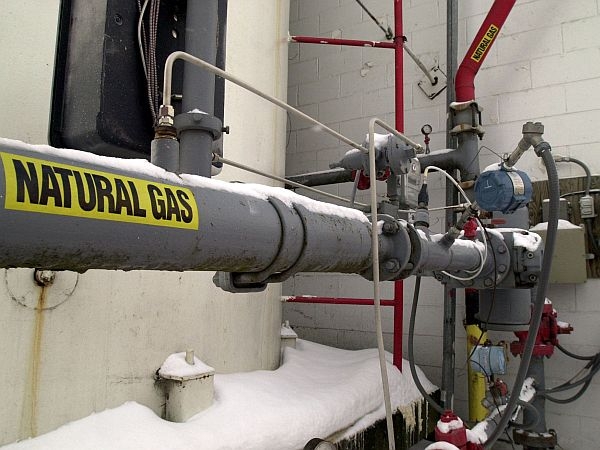 (Host) The state’s draft comprehensive energy plan says Vermont should develop renewable sources of power as a way to reduce greenhouse gas pollution.
(Host) The state’s draft comprehensive energy plan says Vermont should develop renewable sources of power as a way to reduce greenhouse gas pollution.
But the plan also highlights a fossil fuel – natural gas – as a possible energy source if a pipeline were extended down the western side of the state.
The plan is now under fire from critics who say burning more natural gas conflicts with the state’s goal to reduce carbon emissions.
VPR’s John Dillon reports:
(Dillon) The energy plan has an ambitious goal: Vermont should get 90 percent of its energy from renewable sources by mid-century.
Governor Peter Shumlin says the push to renewables will transform the Vermont economy, and give the state a competitive edge. He foresees a day when many Vermonters drive electric vehicles charged by wind and solar generators. Shumlin says those who criticize the energy plan – and its potential cost – are guilty of – quote – "old thinking."
(Shumlin) "There are two reasons why we have to get off of our addiction to oil: The cost is going to rise and burning fossil fuels is going to destroy the planet. Those seem like pretty big ones to me."
(Dillon) Natural gas is a fossil fuel as well, although it produces less carbon pollution than burning oil. The energy plan says natural gas should be available in more areas of the state. The plan supports a western Vermont pipeline proposed by Gaz Metro of Montreal that would extend gas service south of Chittenden County.
(Page) "Well, it talks a lot about building natural gas plants in Vermont, medium sized natural gas plants."
(Dillon) Guy Page of the Vermont Energy Partnership sees a contradiction in the Shumlin administration’s support for natural gas. Page’s group instead wants to extend the life of the Vermont Yankee nuclear plant, which is scheduled to go off line in March.
(Page) "And we think that if Vermont really wants to be a clean, low-carbon state it makes no sense at all to replace a zero emitting power producer with a lot of natural gas. That is just going backwards."
(Dillon) Elizabeth Miller is commissioner of the Public Service Department, the state agency responsible for all things energy. She doesn’t see the state moving backwards with natural gas. Instead, she sees the fuel as providing more choice for Vermont consumers.
(Miller) "Right now we have a natural gas infrastructure that only extends through Franklin and part of Chittenden County. And Vermonters in those parts of the state have a choice in how they heat their homes and run their business. And natural gas is a choice that is less expensive, it has a significant cost advantage to other fossil fuel choices now, and that’s projected to be the case into the future for quite some time."
(Dillon) Miller says the energy plan is flexible and can be changed over time to reflect environmental concerns, including extraction methods that have been controversial in New York and Pennsylvania.
(Miller) "We recognize that the environmental issues associated with the extraction method as well as the potential cost implications associated with the extraction have to be kept in mind. And if pricing changes and projections changes then energy planning should be changed as well."
(Dillon) Miller’s department is working on revisions to the energy plan. A final document will be ready before the Legislature returns in January.
For VPR News, I’m John Dillon in Montpelier